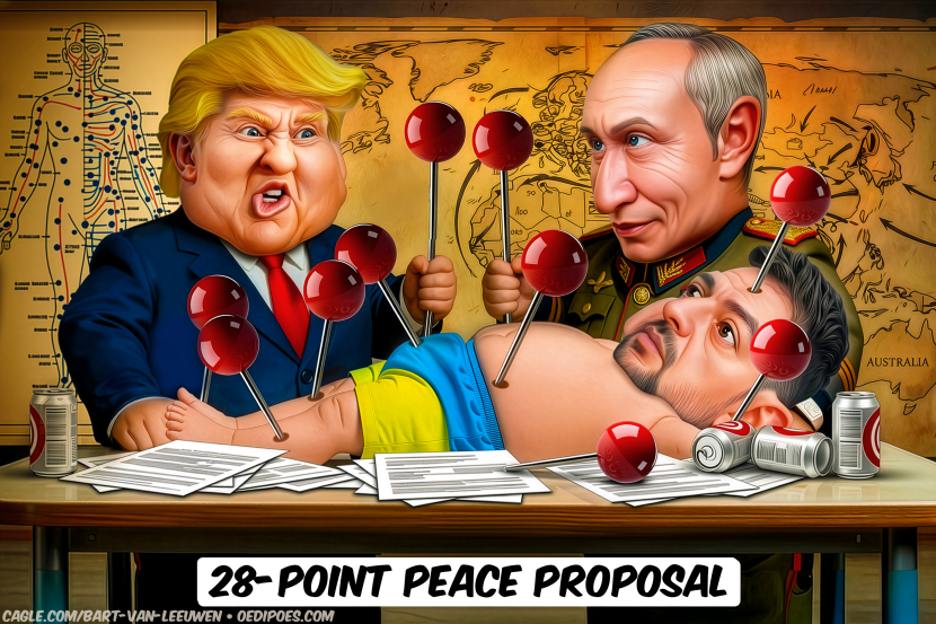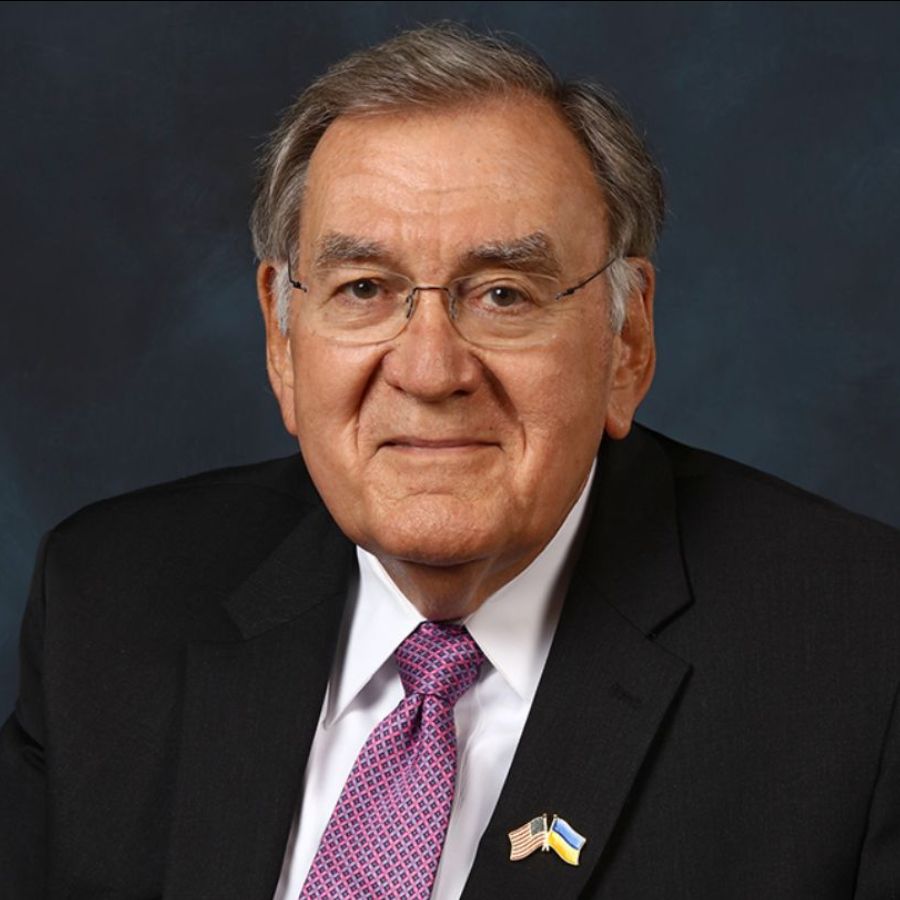Robert A. McConnell | 11/22/2025
Obviously, the media is awash with reactions to the Trump Administration’s so-called “peace plan”.
In yesterday’s blast, my title referenced Yalta, and numerous recipients have suggested Munich as a better reference, and I accept that. However, my reference to Yalta included a reference to Operation Keelhaul, which is why I included Yalta. Yalta included secret protocols, the most odious of which was Operation Keelhaul, and given the way this supposed peace plan was put together, Russia and the United States, with no Ukraine or other impacted countries, I would not be surprised to learn there are secret Witkoff-Putin protocols.
There is so much to say – criticize – about the plan, but one that stands out to me is the requirement that Ukraine trust not only Putin but the United States.
There is no credible evidence that Mr. Putin can be trusted, and certainly not in any context suggesting he would give up his long and clearly expressed intentions toward his neighbors (and the United States).
As for the United States, simply start with how we dishonor the pledge under the Budapest Memorandum and then read the betrayal embodied in the “peace plan.”
The 28-point plan is divorced from reality. Either it is an incompetently designed Rube Goldberg device or a Trojan horse. If the latter, for what purpose? President Trump keeps saying this is not his war, but he will be the one responsible for losing it if the war comes to a tragic end.
Here I set out two of the emerging congressional statements related to the “peace plan” and this morning’s Wall Street Journal editorial on the subject.
The first statement is from Senator Mitch McConnell (R-KY), who earlier this year deservedly received the U.S.-Ukraine Foundation’s Star of Ukraine Award. The second is from the Chairman of the Senate Committee on Armed Services, Roger Wicker (R-MS).
And as usual, a cartoon.

For Immediate Release, November 21, 2025
Contacts: David Popp, Robert Steurer, Stephanie Penn
McConnell Statement on Ukraine
WASHINGTON, D.C. – U.S. Senator Mitch McConnell (R-KY), Chairman of the Senate Appropriations Defense Subcommittee, released the following statement today:
“Putin has spent the entire year trying to play President Trump for a fool. If Administration officials are more concerned with appeasing Putin than securing real peace, then the President ought to find new advisors. Rewarding Russian butchery would be disastrous to America’s interests. And a capitulation like Biden’s abandonment of Afghanistan would be catastrophic to a legacy of peace through strength.”
Chairman Wicker Statement on Ukraine
November 21, 2025
WASHINGTON – U.S. Senator Roger Wicker, R-Miss., Chairman of the Senate Armed Services Committee, today released the following statement.
“This so-called ‘peace plan’ has real problems, and I am highly skeptical it will achieve peace. Ukraine should not be forced to give up its lands to one of the world’s most flagrant war criminals in Vladimir Putin. The size and disposition of Ukraine’s armed forces is a sovereign choice for its government and people. And any assurances provided to Putin should not reward his malign behavior or undermine the security of the United States or allies. In particular, any suggestion that we can pursue arms control with a serial liar and killer like Putin should be treated with great skepticism.”

THE WALL STREET JOURNAL
Trump Issues an Ultimatum to Ukraine
His latest peace offer fulfills Vladimir Putin’s wishes and leaves Kyiv with a terrible choice.
By The Editorial Board | Nov. 21, 2025 7:14 pm ET
His proposal to end Russia's war is actually an ultimatum to Ukraine. Trump suggests he might end American support if Ukraine won't agree, but what might be the costs to the U.S. of a bad deal?
The Trump Administration is making another run at ending the war in Ukraine, and a lasting peace with honor would be a laudable achievement. But for three years the only peace on offer has been Ukraine’s surrender, and the latest American offer—really, an ultimatum—is merely another dressed-up version.
The 28-point plan that was mooted in the press but became public on Thursday includes a reduction in Ukraine’s military and a cap on its manpower at 600,000, from about 900,000 now. It isn’t clear if foreign peace-keeping troops would be allowed on Ukraine’s soil or if it could maintain long-range weapons.
The deal hands Mr. Putin all of the Donbas in the east. He’d pocket the territory he’s already seized there—and get the rest that Ukraine still holds despite nearly four years of Russian assaults.
Ukraine would forfeit its right to join a defensive Western alliance in NATO. Oh—and the U.S. and Ukraine would recognize Russian control of Crimea, which Mr. Putin took by force in 2014. Mr. Putin has made these demands since 2022 after his failed storming of Kyiv.
***
This managed capitulation would be a bitter pill in Ukraine. “Now is one of the most difficult moments in our history,” Volodymyr Zelensky said on Friday. Ukraine must choose between “dignity, or the risk of losing a key partner.”
That bracing remark underscores that Mr. Trump is essentially saying Ukraine must agree to his terms or he will stop U.S. weapons and intelligence support. Mr. Zelensky is in a weakened domestic position amid the embarrassment of a fresh corruption scandal in Kyiv. But after Mr. Putin’s brutalities, it will be hard for any Ukrainian patriot to sell this settlement to the Ukrainian public.
Trump officials will say that Mr. Trump is for the first time offering an explicit U.S. security guarantee, albeit details unknown. The decision for Ukraine is whether to believe this guarantee. A parchment promise does not mean Mr. Putin has abandoned his designs to control Ukraine. For him it is an ideological and historical mission that is part of his legacy. “If Vladimir Putin lives up to a cease-fire or peace treaty with Ukraine,” as Sen. Roger Wicker put it this year, “it will be the first time ever.”
Then there are the questions for the United States. Mr. Putin’s method is to push against red lines and probe the will of his opponents. Mr. Trump will have handed Mr. Putin favorable terrain in the east that helps the Russian make a direct run for Kyiv when he’s rearmed and ready.
Mr. Trump’s offer would defang a fighting ally in Ukraine—the kind the Administration says it wants—and expose the U.S. to a greater risk of a direct confrontation with Russia. Where are the supposed realists and restrainers who run this Administration? We are supposed to believe that the same President who won’t sanction China for buying Russian oil and assisting its war machine will go to war for Kyiv?
And assume for a moment that Mr. Trump is prepared to back up his promise to Ukraine with the lives of the men and women of the U.S. military. What about a President JD Vance or President Gavin Newsom?
Also extraordinary is the offer to rescue and rehabilitate Mr. Putin financially. “Russia will be reintegrated into the global economy,” the document says, and return to make the G7 again the G8 group of nations. Russia would be the only dictatorship in that group.
The U.S. will enter some “long-term economic cooperation agreement” with Russia, an outgrowth of the Trump delusion that Mr. Putin can be wooed with commerce. The plan floats working with Russia on—we are not making this up—artificial intelligence. Mr. Trump might as well skip the middle man and surrender the U.S. tech advantage to China directly.
Mr. Trump insists the war in Ukraine is Europe’s problem, but then why not first consult those who live in Mr. Putin’s backyard? The deal looks like an echo of Trump’s first term freeze out of the Afghan government while Zalmay Khalilzad negotiated with the Taliban in Doha. That set the stage for President Biden’s abandonment of Afghanistan.
***
Mr. Trump may figure he can finally wash his hands of Ukraine if Europe and Ukraine reject his offer. He’s clearly sick of dealing with the war. But appeasing Mr. Putin would haunt the rest of his Presidency. If Mr. Trump thinks American voters hate war, wait until he learns how much they hate dishonor.
Mr. Trump can tarnish his legacy if he wants, but the bigger risk here is to the United States. A bad deal in Ukraine would broadcast to U.S. enemies that they can seize what they want with force or nuclear blackmail or by pressing on until America loses interest. The odds of a Pacific crisis will go up.

ROBERT MCCONNELL
Co-Founder, U.S.-Ukraine Foundation
Director of External Affairs, Friends of Ukraine Network
The introduction is Mr. McConnell’s and does not necessarily reflect the views of the U.S.-Ukraine Foundation or the Friends of Ukraine Network (FOUN).
.png)